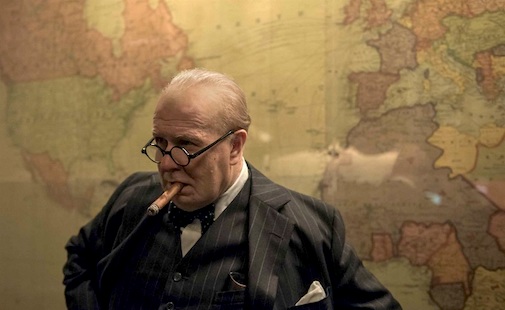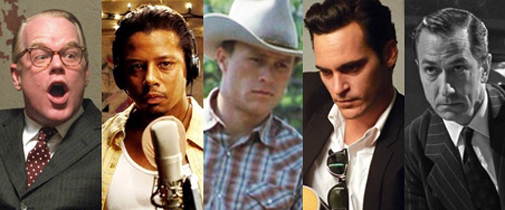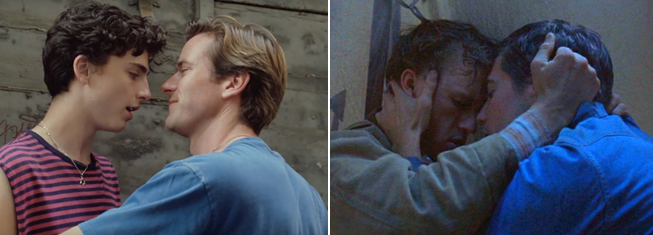by Ben Miller

Film blogger Jordan Ruimy posited an observation a month ago on Twitter:
In 2002 Gary Oldman would have been a cinch to win Best Actor, in 2017 he's a major question mark. The Oscars have changed.
While the awards season definitely shifted thereafter, his tweet remains at least partially true. Look at the history of the Best Actor Oscar. From 1990 to 1997, every winner had a specific ailment (criminal insanity, alcoholism, AIDS), while 1998 to 2001 had a run of death scenes. Of the past 16 years, starting with Adrien Brody in 2002, 10 winners have been for portrayals of real people (Casey Affleck's win last year broke a four-year run of biopic winners). There are always patterns to Oscar behavior.
This year’s slate of Best Actor nominees has an interesting parallel with the Best Actor race of 2005. Let’s take a look back at the lineup...

- Philip Seymour Hoffman, Capote (winner)
- Terrence Howard, Hustle & Flow
- Heath Ledger, Brokeback Mountain
- Joaquin Phoenix, Walk the Line
- David Strathairn, Good Night, and Good Luck
Right off the bat, the easy comparison would be Hoffman and Oldman. Both experienced character actors turning in technically brilliant performances in biopics. But they aren't of course exact equivalents due to the changes in awards season preferences over the years. Their careers were not at the same juncture either. Oldman has been considered overdue for the better part of two decades while Hoffman was on his first nomination. Capote won Hoffman every single award he was personally nominated for, with the exception of the London Film Critics Circle Award. Oldman's Oscar trajectory hasn't been as forceful. He didn't start dominating until the televised awards began with the Golden Globes.
The nomination / performance that's aged the best from 2005 came from the youngest nominee. Heath Ledger emerged from the shadow of young stardom to deliver a subtly devastating performance in Brokeback Mountain at age 26. Look no further than 22 year-old Timothee Chalamet in Call Me by Your Name for a modern equivalent. The comparison is even easier given that both were starring in gay romantic dramas. Ledger picked up a fair amount of nominations for his role, but finished behind Hoffman all allong the way. Chalamet, on the other hand, has been winning Best Actor and breakthrough awards, including from the two most important critics groups The New York Film Critics Circle and the Los Angeles Film Critics Association.

(For a possibly wide variety of reasons, Oldman has been receiving some blowback for his role. Scan social media and you will find a hot take or five about how Oldman’s Winston Churchill is nothing more than skilled imitation while Chalamet is the one doing the real work. Despite being the frontrunner all season, this backlash only really began with the Globes. Attribute it to either Oldman’s troubling politics, or general attrition of the biopic as Oscar vehicle. Or maybe we can chalk it up to the desire for fresh blood.)
All Oscar lineups have the “happy to be here” performance that no one expects can win and they're often from breakout players. 2005 brought us Terrence Howard’s soulful rapper from Hustle & Flow, and for 2017 we have Get Out’s Daniel Kaluuya. Howard was (slightly) further along in his career in 2005 than Kaluuya is now but Kaluuya is moving swiftly. While critically lauded and successful, Hustle & Flow never had the zeitgeist force of Get Out, so Howard expanded his fame with Marvel's Iron Man a couple of years after that indie/Oscar breakthrough. Kaluuya, though, has already headlined a blockbuster and he won't even make it to Oscar night before he's playing inside the Marvel universe himself. Black Panther opens February 16th.
The nominations for character actor David Straithairn (Good Night, and Good Luck.) and the then-more mainstream Joaquin Phoenix (Walk the Line) are where the 2005/2017 comparison breaks down. You can't really compare them to Daniel Day-Lewis and Denzel Washington, two of cinema's most iconic legends and Oscar beloveds, too. But, to bring us back to the opening statement, you'll note that the former duo were starring in biopics (all the rage w/ voters for years) while the latter duo are crafting original characters.
What does this all mean?
As much as the Academy has changed, old habits die hard. The industry may like to think of itself as progressive and boundary-pushing, but expect them to revert to the norm and recreate 2005 down to the tee. Come Oscar night, Gary Oldman will walk away with the statue for his big biographical drama which might have won in any earlier year in history. Chalamet’s performance is revelatory but, for Oscar, there is comfort in repetition.
Related: Best Actor Chart